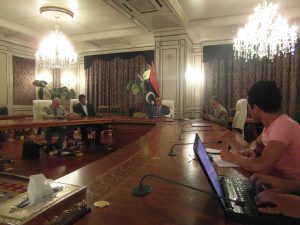By Sami Zaptia.
 Tripoli, 1 August 2013:
Tripoli, 1 August 2013:
At yesterday’s press conference, Prime Minister Ali Zeidan performed a total u-turn on his intention to have a cabinet reshuffle.
Zeidan gave as the reason for his inability to re-shuffle his government and reduce it in size the “structure” of the Ministries.
He said that Ministries would have to keep their “structure” because the budgets had been allocated on the basis of the present Ministries/structures.
However, he did reveal that there will nevertheless be a smaller working cabinet or Crises Committee, or what is sometimes referred to as an inner cabinet in the UK.
Led by the Prime Minister, this new inner cabinet will consist of five Ministers: Foreign, Defence, Interior, Finance and Justice, as well as the head of intelligence.
It will meet daily or more when necessary, Zeidan said. He said that whilst the other Ministries will have to remain as they are, there could be some changes to some Ministers. He would not reveal who these might be, saying that the GNC would have to approve these changes before being announced.
He did, however, reveal again that he was having difficulty getting people to accept positions as Ministers.
He said that he was awaiting the response of the GNC on his proposals for Defence, Information, Local Government and Social Affairs Ministers.
It is not clear if Zeidan’s back-peddling on his decision to reduce his government is indeed as a result of the budget restraints, or whether he had encountered opposition.
Choosing the cabinet is a very fine balancing act. He has to please all political parties, tribes, regions and the thuwar/militias. Changing this balance would have taken time and much political horse trading.
Moreover, if Zeidan had introduced any brand new Ministers, there would have been the matter of getting them approved by the Political Isolation Law Committee, the successor to the Integrity Commission.
It had taken Ali Zeidan months to gain approval for his cabinet from both the GNC and the then Integrity Commission, hot on the heels of the rejection of Mustafa Abushagur’s failure to form a government in October 2012.
Last year, there was a series of rejections by the Integrity Commission as well as appeals and over-rulings by the GNC itself.
The process could have been divisive, lengthy and traumatic for a weak government trying to hold Libya together. In view of this, both Zeidan and the GNC probably decided the timing was not right for such a move.
libya herald

Prime Minister Ali Zeidan (centre) performed a u-turn on his intended cabinet reshuffle (Photo:Sami Zaptia).
At yesterday’s press conference, Prime Minister Ali Zeidan performed a total u-turn on his intention to have a cabinet reshuffle.
Zeidan gave as the reason for his inability to re-shuffle his government and reduce it in size the “structure” of the Ministries.
He said that Ministries would have to keep their “structure” because the budgets had been allocated on the basis of the present Ministries/structures.
However, he did reveal that there will nevertheless be a smaller working cabinet or Crises Committee, or what is sometimes referred to as an inner cabinet in the UK.
Led by the Prime Minister, this new inner cabinet will consist of five Ministers: Foreign, Defence, Interior, Finance and Justice, as well as the head of intelligence.
It will meet daily or more when necessary, Zeidan said. He said that whilst the other Ministries will have to remain as they are, there could be some changes to some Ministers. He would not reveal who these might be, saying that the GNC would have to approve these changes before being announced.
He did, however, reveal again that he was having difficulty getting people to accept positions as Ministers.
He said that he was awaiting the response of the GNC on his proposals for Defence, Information, Local Government and Social Affairs Ministers.
It is not clear if Zeidan’s back-peddling on his decision to reduce his government is indeed as a result of the budget restraints, or whether he had encountered opposition.
Choosing the cabinet is a very fine balancing act. He has to please all political parties, tribes, regions and the thuwar/militias. Changing this balance would have taken time and much political horse trading.
Moreover, if Zeidan had introduced any brand new Ministers, there would have been the matter of getting them approved by the Political Isolation Law Committee, the successor to the Integrity Commission.
It had taken Ali Zeidan months to gain approval for his cabinet from both the GNC and the then Integrity Commission, hot on the heels of the rejection of Mustafa Abushagur’s failure to form a government in October 2012.
Last year, there was a series of rejections by the Integrity Commission as well as appeals and over-rulings by the GNC itself.
The process could have been divisive, lengthy and traumatic for a weak government trying to hold Libya together. In view of this, both Zeidan and the GNC probably decided the timing was not right for such a move.
libya herald
ليست هناك تعليقات:
إرسال تعليق